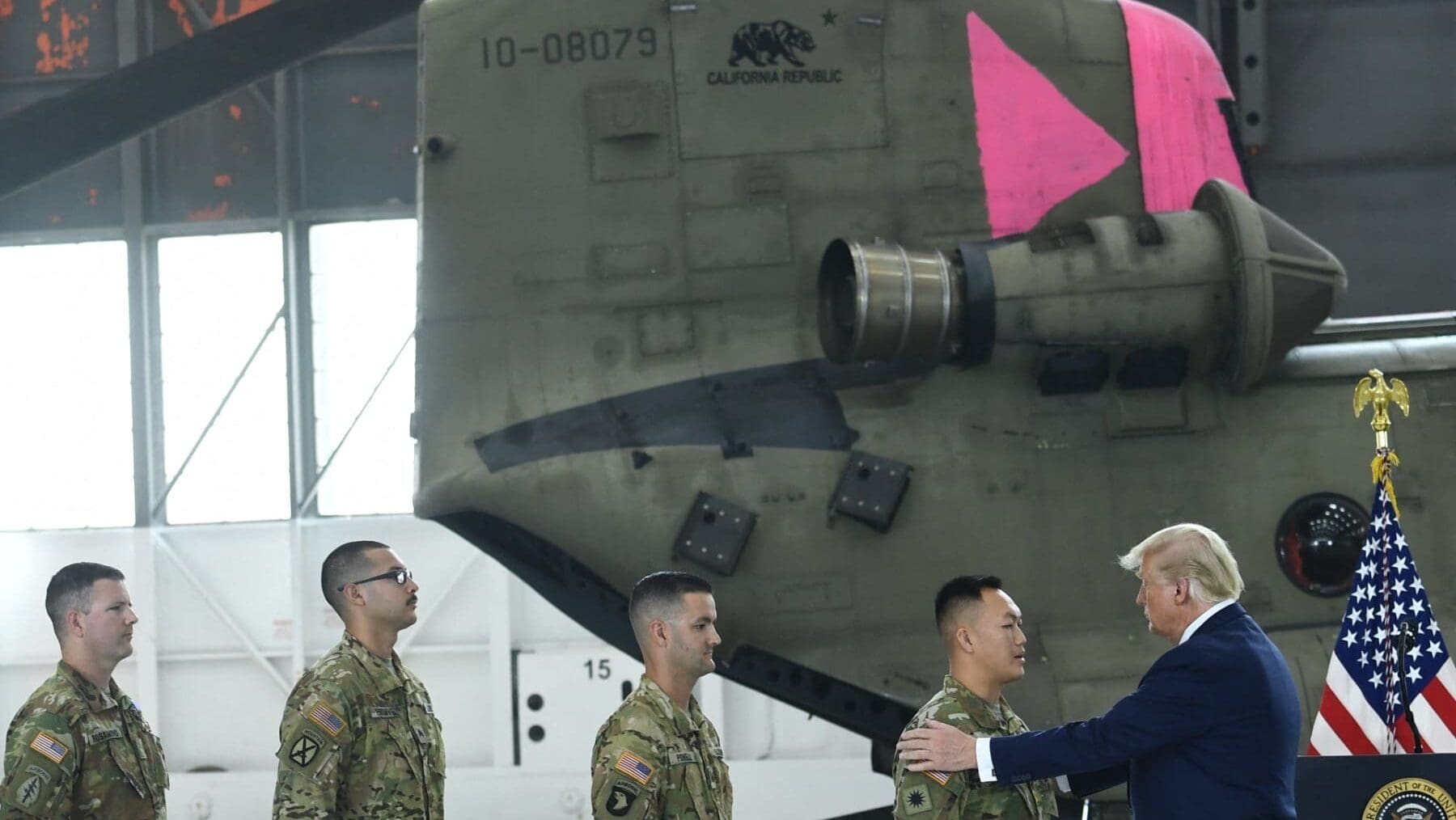
U.S. President Donald Trump awards the Distinguished Flying Cross to pilots and crew members of the California Army National Guard at Sacramento McClellan Airport in McClellan Park, California on September 14, 2020.
Photo: Brendan Smialowski / AFP
Donald Trump will be just as tough on the United States’ NATO allies as he was during his presidency but he will not leave the organisation, as some European countries worry, according to a report by Politico. Despite the fear-mongering by the European liberal elites about the dangers of a potential Trump comeback, the article concludes that his administration actually contributed to the strengthening of the military alliance.
The American publication talked to national security officials and defence experts who are likely to serve in a second Trump term. The Republican former president is leading opinion polls and has a good chance of defeating his Democratic rival, current U.S. President Joe Biden in the November elections.
Trump has been insistent that the United States’ European allies should contribute more to NATO spending as the U.S. is by far the largest contributor to NATO operations: it spent $860 billion on defence, which represented 68% of the total expenditure of NATO countries in 2023.
Some of Trump’s previous comments about the alliance have worried and angered European NATO members. In his 2016 election campaign he called NATO “obsolete,” and early this year, he warned the United States’s allies it would not rush to defend them if they failed to live up to their spending obligations, saying: “You gotta pay. You gotta pay your bills.”
But in reality, and during his presidency, Trump showed no signs of wanting his country to quit NATO but actually made the organisation stronger, by continuously urging member states that had not reached the threshold of spending 2% of their GDP on defence, to start paying more. The result: at the beginning of his presidency in 2016 only five (out of 28) NATO members fulfilled the 2% spending criteria; this year, former NATO chief Jens Stoltenberg reported that 23 (out of 32) are expected to reach that target.
NATO operates in U.S. dollars—meaning when a NATO country’s currency exchange rate weakens against the U.S. dollar, reaching the 2% goal will be more expensive for the member nation.
While previous presidents George W. Bush and Barack Obama, as well as Trump’s successor, Joe Biden, all urged allies to spend more, nobody has been as effective as Trump. As Trump’s last national security advisor, Robert O’Brien writes in an essay in Foreign Affairs:
Although critics often depicted Trump as hostile to traditional alliances, in reality, he enhanced most of them. Trump never canceled or postponed a single deployment to NATO. His pressure on NATO governments to spend more on defence made the alliance stronger.
More of the same would come in a second Trump administration: he would continue to pile pressure on his NATO allies but also undertake a “radical reorientation” of NATO, defence expert Dan Caldwell told Politico. According to these plans, the U.S. would keep its nuclear umbrella over Europe by maintaining its airpower and bases in Germany, England, and Turkey, and its naval forces as well. Meanwhile, the bulk of infantry, armour, logistics, and artillery would ultimately pass from American to European hands. Officials close to Trump say Europe must share some of the burden as the United States faces a military challenge by both China and Russia.
Another plan, according to insiders, would be to establish a two-tier system within NATO, meaning that member countries that have not yet met the 2% GDP target on defence “wouldn’t enjoy the defence largess and security guarantee of the United States.”
While European NATO member states have discussed the need for the EU to become more self-reliant in defence, and have even floated the possibility of creating a European army, “the reality is that sovereign states—not the EU—will have to take pragmatic action to expand their militaries into forces worthy of the global stage,” argues Benjamin Sanders in his analysis for The European Conservative. He writes:
Even with NATO as a continuing entity in the West, it must be national governments that remain primarily responsible for any reaction to global threats. This can only be sustained if Western European nations stop cutting their troop numbers, as they have consistently done in the post-war period, and take a leaf out of Poland’s book to reverse the decline. There is simply no evidence that war will disappear from this world anytime soon; and, if anything, the last decade has proved the opposite.
With regards to the war in Ukraine, which has been raging for more than two years, Politico writes that Trump would like a swift resolution to the conflict by committing to no further eastward expansion of NATO—specifically into Ukraine and Georgia—and negotiating with Russian President Vladimir Putin over how much Ukrainian territory Moscow can keep. Donald Trump has on several occasions said that war would never have broken out had he been the president, but that he would bring it quickly to an end if he gets reelected.
Whether the plans presented in the article come even close to what Trump has in mind remains to be seen.
